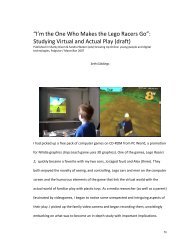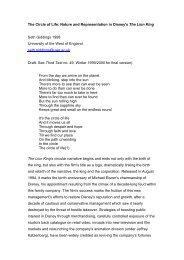Walkthrough: videogames and technocultural form - Seth Giddings
Walkthrough: videogames and technocultural form - Seth Giddings
Walkthrough: videogames and technocultural form - Seth Giddings
Create successful ePaper yourself
Turn your PDF publications into a flip-book with our unique Google optimized e-Paper software.
easons of focus – I hope that the conceptual frameworks developed here will be robust enough to allow<br />
considerations of techno-economics of everyday life to be factored in.<br />
science or technoscience<br />
As its name suggests, Science <strong>and</strong> Technology Studies is equally concerned with science (or ‘technoscience’)<br />
as with technologies. Cybercultural studies <strong>and</strong> cyberfeminism has <strong>and</strong> is undertaking crucial work on<br />
(techno)science, for instance on genetic engineering or reproductive technologies. Again for reasons of focus<br />
this project is concerned with the technological <strong>and</strong> <strong>technocultural</strong> <strong>and</strong> not with science.<br />
networks <strong>and</strong> the Internet<br />
The thesis is centrally concerned with <strong>videogames</strong> but will touch on other new media technologies <strong>and</strong> <strong>form</strong>s<br />
(e.g. the Web) as <strong>and</strong> when relevant. It will be argued that an underst<strong>and</strong>ing of <strong>videogames</strong> is crucial to the<br />
study of popular new media, but it should be pointed out that this project does not fully explore key<br />
differences with other new media <strong>form</strong>s. As will be discussed in Part 1.1, recent new media studies has<br />
privileged the Internet as its key object of study. A key premise in this context is that <strong>videogames</strong> are not the<br />
insignificant phenomenon they are often portrayed as, but exemplars of both the everyday experience of<br />
computer-based media, <strong>and</strong> a technological imaginary of new media – at least as significant as the Internet.<br />
My concern in this study is in part with the implications of the intimate relationships between the<br />
human <strong>and</strong> the technological in videogame play, i.e. between the player, the computer or console <strong>and</strong> the<br />
game (as software). To maintain focus therefore, I will not be studying multiplayer games or the multiplayer<br />
options of games which offer a choice between single- <strong>and</strong> multi-play. This is not to ignore networked<br />
computer media - Parts 1 <strong>and</strong> 3 cover the literature on the continuities <strong>and</strong> ruptures in everyday life <strong>and</strong><br />
notions of identity as they are permeated by new media – computer games in general <strong>and</strong> non-instrumental,<br />
ludic uses of computer technologies <strong>and</strong> Internet media in general. Moreover, a clear distinction between<br />
<strong>videogames</strong> <strong>and</strong> the Internet as discrete new media is no longer sustainable. As well as numerous web-based<br />
games, since this project was started in the late 1990s, a distinctly new <strong>form</strong> of computer game has<br />
developed. Massively Multiplayer Online Role-Playing Games (MMORPGs) such as Everquest <strong>and</strong> World of<br />
Warcraft offer the graphic <strong>and</strong> spatial qualities of console <strong>and</strong> singleplayer PC games but within the much<br />
more open-ended, social, <strong>and</strong> per<strong>form</strong>ative structure developed in the MUDs. Millions of players are<br />
registered for single games, <strong>and</strong> tens of thous<strong>and</strong>s might be playing at any one time. The new <strong>form</strong>s of<br />
21




